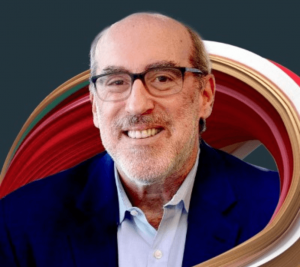By Lacie Blankenship

Jeff Schwartz
Jeff Schwartz, Vice President of Insights and Impact, Gloat and Senior Advisor Future of Work, Deloitte, has studied the Future of Work for nearly 10 years. He founded the Future of Work practice at Deloitte and has written several books on the topic, Work Disrupted being his most recent.
In November, Schwartz joined Dean Johnson for the Distinguished Speaker Series (DSS), a student-led initiative where business leaders share lessons and advice with the Vanderbilt Business community. Below, we share 3 key takeaways from their discussion.
3 Types of Change Are Underway
“Einstein said ‘you can’t use an old map to explore a new world,’ that in many ways encapsulates the challenge we have today,” says Schwartz.
Work itself is changing
Instead of focusing primarily on productivity, the focus for many has shifted to include innovation and impact along with productivity. People are working alongside technology as well, which also impacts the nature of work.
The workforce is changing
Schwartz wrote his first article on the Future of Work in 2013, where he first discussed the trends of an open talent economy, which has persisted in the form of freelance and gig work.
“A big percentage of employees and workers aren’t employees anymore,” says Schwartz. “Now we know them as freelance workers, gig workers, contract workers, and crowd workers.”
Expectations are evolving. Schwartz noted the concept of 100-year lives and 50-60 year careers, multi-chapter careers, and career-switching.
The workplace is changing
The third type of change happening should be no surprise. The past 2 years forced professionals to adapt to an altered workplace. Even still, more organizations are remaining online, selling/re-locating corporate building space, and recruiting from afar.
“You used to be able to associate the work we do and the workplace we have. Teachers taught in schools, doctors did work in clinics, factory workers did work in factories,” says Schwartz. “We have started to in many ways really change the relationship between work and place.”
The definition of work has changed
“We are in a much different place in 2022 and 2023 than we thought we were going to be in 2019,” says Schwartz. “Sometimes we talk about it in terms of acceleration, I think of it as a shift, I think of it as a disruption. We thought we were starting at point A, and we’re actually starting at point F.”
For many years in management and business, work itself was very clearly defined by jobs/tasks that needed to be accomplished. It was highly predictable and stable. Recruiting and hiring processes could be done years in advance because trajectories were very routine. As Schwartz says, “that’s not where we are anymore.”
Today’s workforce offers more paths to jobs and careers that embrace variety.
“In the pandemic, it really didn’t matter what skills we thought you had. what mattered was what we needed to do and how people could contribute in different ways,” says Schwartz. “The automotive industry going from producing automobiles, a complicated machine with 2,000 parts, to producing ventilators, a machine with 700 parts.”
“The challenge for leaders is to ask themselves ‘do I have a narrative, do I have a framework that’s relevant to the questions we have today,” says Schwartz.
Up Next: Reimagination
“We are moving from a moment of adaptation to a moment of reimagination,” says Schwartz.
With so many people and organizations learning to pivot and setting great examples of flexibility, Schwartz believes the next challenge will be to continue adapting and nurturing in a professional and positive way.
“I think we’re going to see a lot of talk about redesigning, reframing, and rethinking,” says Schwartz. “When I think about 2023, my eye is more on 2025 and 2030.
“We were pinned down by the pandemic in a way that we had to adapt and survive and we saw amazing adaptability and agility of the workforce, of society, and of our businesses.”
You can watch the recap of the conversation on the Vanderbilt Business YouTube here.
The DSS speaker series is partially funded by The Alec and Susan Taylor Visiting Speakers Fund.